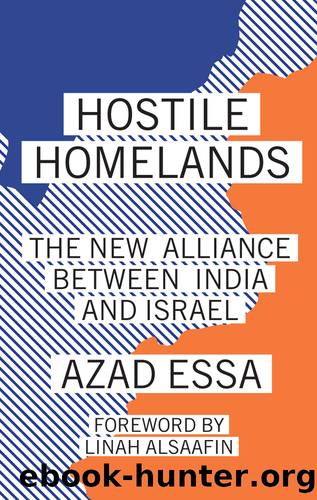Hostile Homelands by Essa Azad;Alsaafin Linah;

Author:Essa, Azad;Alsaafin, Linah;
Language: eng
Format: epub
Publisher: Pluto Press
The Guzofsky-Vyasmaan Affair
It was the summer of 2001. A website, called âHindu Unityâ and âSoldiers of Hindutvaâ run by Indian Americans in New York was dropped by its service provider after it received complaints that the website had been publishing names of people it deemed to be enemies of Hinduism and encouraging violence against them.44 Rohit Vyasmaan, who helped run the website, immediately called up a man named Michael Guzofsky from Brooklyn and asked for help.45 Guzofsky reached out to another service provider and got the site back up. Guzofksy admitted he didnât know much about Vyasmaan or the group. All he knew was that they were standing up to Muslims and he wanted to help.
Guzofsky, it turned out, wasnât just a man with a computer; he was the manager of a website belonging to the extreme Israeli group Kahane, named after Rabbi Meir David Kahane, the founder of the Jewish Defence League (JDL) in the U.S. and the Kach political party in Israel.46 Guzofsky claimed he supported the Hindu groupâs first amendment right to express its views. But it didnât take much for him to reveal the real reason for championing the site. In an interview at the time with the New York Times, Guzofsky said the alliance was a practical one that demonstrated a common suffering at the hands of Muslims. He said the Jewish-Hindu relationship was born out of adversity. âI definitely understand their pain even if I donât know much about their faith,â Guzofsky was quoted as having said.47
The website, âHindu Unity,â was no bastion of free speech. A project of the Bajrang Dal, an extremist movement in India, it encouraged attacks on activists or scholars who critiqued Hindu nationalism and carried articles that called Hindus to stand up and take up arms and exterminate Muslims.48 Whereas the Kahane group called for the expulsion of all Palestinians, the Bajrang Dal called for the purge of Muslims from India and pioneered the demolition of Babri Masjid in 1992. As political organizations, the Kahane group and Bajrang Dal were therefore almost indistinguishable.49 âWe are fighting the same war . . . Whether you call them Palestinians, Afghans or Pakistanis, the root of the problem for Hindus and Jews is Islam,â said Vyasmaan, who had a photograph of Rabbi Kahane on display in his home in Queens. Months later, the attacks of September 11, 2001 in New York City and the December 13, 2001 attacks on Indiaâs parliament in New Delhi would take place.
The thirst to âprotectâ freedom and democracy from the civilizational threat of Muslims, became the principal cover for expanding surveillance, extra-judicial killings, torture and propel closer ties between the governments as well as right wing movements in America, Israel, and India. In 2002, Daniel Pipes, the renowned right wing academic, formed a blacklist of his own, called âCampus Watch.â Whereas âHindu Unityâ had looked to vilify Muslims, secularists, and communists for critiquing Hindu nationalism, Pipesâ blacklist looked to denigrate academics who expressed critical views about U.S. foreign policy or Israel.
Download
This site does not store any files on its server. We only index and link to content provided by other sites. Please contact the content providers to delete copyright contents if any and email us, we'll remove relevant links or contents immediately.
| Chakras | Gandhi |
| History | Rituals & Practice |
| Sacred Writings | Sutras |
| Theology |
Fingersmith by Sarah Waters(2531)
Kundalini by Gopi Krishna(2179)
Wheels of Life by Anodea Judith(2141)
Indian Mythology by Devdutt Pattanaik(1933)
The Bhagavad Gita by Bibek Debroy(1918)
The Yoga of Jesus: Understanding the Hidden Teachings of the Gospels by Paramahansa Yogananda(1845)
Autobiography of a Yogi (Complete Edition) by Yogananda Paramahansa(1811)
The Man from the Egg by Sudha Murty(1804)
The Book of Secrets: 112 Meditations to Discover the Mystery Within by Osho(1658)
Chakra Mantra Magick by Kadmon Baal(1638)
The Sparsholt Affair by Alan Hollinghurst(1583)
Sparks of Divinity by B. K. S. Iyengar(1529)
Gandhi by Ramachandra Guha(1528)
Avatar of Night by Tal Brooke(1518)
Karma-Yoga and Bhakti-Yoga by Swami Vivekananda(1487)
The Bhagavad Gita (Classics of Indian Spirituality) by Eknath Easwaran(1477)
The Spiritual Teaching of Ramana Maharshi by Ramana Maharshi(1426)
Hinduism: A Very Short Introduction (Very Short Introductions) by Knott Kim(1371)
Hindoo Holiday by J. R. Ackerley(1371)
